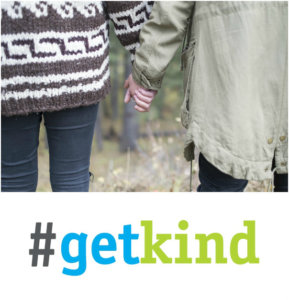 Each month, Random Acts debuts a new #GetKind theme meant to channel supporters’ collective energy toward a uniquely important cause. In the month of May, we chose to focus our efforts on the theme of Mental Health, spreading awareness for those who live with different issues regularly. This month, piggybacking on that topic, Random Acts chose Recovery as its designated theme — one that carries on the idea of raising support for those who might need it most.
Each month, Random Acts debuts a new #GetKind theme meant to channel supporters’ collective energy toward a uniquely important cause. In the month of May, we chose to focus our efforts on the theme of Mental Health, spreading awareness for those who live with different issues regularly. This month, piggybacking on that topic, Random Acts chose Recovery as its designated theme — one that carries on the idea of raising support for those who might need it most.
In 2014, approximately 43.6 million adults aged 18 or older in the United States were treated for broad mental health issues, according to a survey carried out by the National Institute of Mental Health. That number “represented 18.1 percent of all U.S. adults”, according to the researchers. An earlier 2008 study carried out by NIMH showed that only 58 percent of those adults with serious illnesses or conditions received treatment. The majority of those patients were treated through prescription drugs or outpatient therapy. A little over 7 percent received inpatient treatment. Among children and teens with mental health conditions, around 50 percent underwent some form of treatment overall.
 Those numbers, of course, don’t account for the vast number of Americans who live with addiction problems or substance abuse issues, either former or current. According to the Substance Abuse and Mental Health Services Administration’s (SAMHSA’s) National Survey on Drug Use and Health, in 2009, 9.3 percent of people 12 or older required rehabilitation services for a substance issue or recovery — around 23.5 million people total. SAMHSA reported that just “2.6 million — 11.2 percent of those who needed treatment — received it at a specialty facility.”
Those numbers, of course, don’t account for the vast number of Americans who live with addiction problems or substance abuse issues, either former or current. According to the Substance Abuse and Mental Health Services Administration’s (SAMHSA’s) National Survey on Drug Use and Health, in 2009, 9.3 percent of people 12 or older required rehabilitation services for a substance issue or recovery — around 23.5 million people total. SAMHSA reported that just “2.6 million — 11.2 percent of those who needed treatment — received it at a specialty facility.”
Of course, the location of someone’s recovery or rehabilitation doesn’t matter nearly as much as the fact that they’re getting help at all — it can be difficult to reach out and ask for a hand or for assistance in staying healthy, no matter what your age.
That’s where Random Acts’ supporters come in.
How To Help Those In Recovery
In the vein of this month’s official #GetKind theme, there are a few things you can do to pitch in:
 Recognize your limitations. First and foremost, it’s crucial that supporters remember this above all else: If you’re not a medical professional, it’s not expected of you to provide assistance that a doctor, nurse, or therapist would otherwise give. You can only do so much — but know that whatever you do, it’s more welcome than you know. Pushing past your knowledge base in situations like this can be dangerous for all involved, so educate yourself first and talk to a professional about how you can help in specific cases without overstepping boundaries.
Recognize your limitations. First and foremost, it’s crucial that supporters remember this above all else: If you’re not a medical professional, it’s not expected of you to provide assistance that a doctor, nurse, or therapist would otherwise give. You can only do so much — but know that whatever you do, it’s more welcome than you know. Pushing past your knowledge base in situations like this can be dangerous for all involved, so educate yourself first and talk to a professional about how you can help in specific cases without overstepping boundaries.
- Understand that you matter as well. If you’re suffering from conditions or find yourself in a situation where you need help, know that getting-kind for yourself is just as important as helping others. Be good to yourself first, then lend support where you can.
- Get smart. Reading up on a friend or family member’s condition or addiction can be a great start. But for real understanding, turn to a professional. Therapists, doctors, and nurses are there to help not only their patients, but to give advice to those patients’ family, friends, and loved ones as well. A healthy support network makes the process go much more smoothly.
- Support sobriety by eliminating the taboo. The next time a friend feels uncomfortable explaining why they can’t go to that concert or have a glass of wine with friends, be there to show them that their recovery is something to be proud of.
 Stand by them when they need a shoulder to lean on and withhold judgment when they open up to you. Seek advice from a counselor if you think that you and your loved one need it. Don’t be scared to talk openly with them, if that’s what they need.
Stand by them when they need a shoulder to lean on and withhold judgment when they open up to you. Seek advice from a counselor if you think that you and your loved one need it. Don’t be scared to talk openly with them, if that’s what they need.
- Accept, without judgment, that addiction is a disease, not a choice. Substance abuse issues, addictive tendencies, and physical conditions such as body dysmorphia require highly-trained expertise to overcome — but that doesn’t mean you can’t try to understand them. Remember that the person living with any of those conditions didn’t necessarily choose to be that way — often it’s much deeper than that. Show kindness accordingly.
- Help establish or find a network of others in recovery. Having a wide range of voices lending their own stories to someone’s journey to recovery can be wildly helpful. Seek out safe spaces where you or your loved one can talk openly and without judgment.
- Hit the pavement: Donate and advocate. There are plenty of amazing rehabilitative or recovery
 services out there that operate in large part thanks to the generosity of others. Give what you can or volunteer time and speak out on issues important to specific conditions. Write to your local representative to find out how to push for helpful legislation on a local, state, or national level.
services out there that operate in large part thanks to the generosity of others. Give what you can or volunteer time and speak out on issues important to specific conditions. Write to your local representative to find out how to push for helpful legislation on a local, state, or national level.
- Support others after rehab or treatment as well. This can be one of the most trying times of the recovery process. Be there to talk or listen, or pop in to check up on a loved one and let them know you’re there, even if it’s just to have tea and play a few board games with them.
This month, be a spark of light in someone’s darkness, a welcome hug when the process gets tough, or a voice of advocacy in an otherwise grim fight. Your kindness is part of someone else’s (or your own) recovery process, whether you realize it yet or not.
Are you ready to #GetKind?
